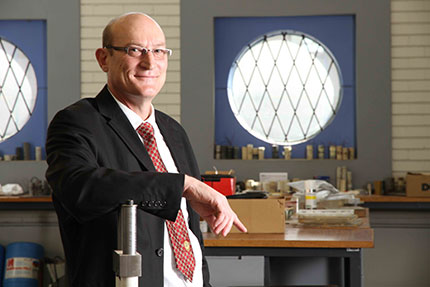Prof Cawood prepares for “his second life”
-
Witsies and industry pay tribute to mining institute’s beloved director.
After 22 years with the Wits School of Mining Engineering, the school paid tribute to Wits Mining Institute Director Professor Fred Cawood (GDE Min Eng 1995, MSc Eng 1997, PhD 2000) on the eve of his retirement.
An accomplished academic, who lectured across various levels of study at the university and supervised many students, Prof Cawood said he looked forward to starting his “second life”.
“I have a strong bond with Japan,” he explained. “The Japanese believe your second life starts at the age of 60. You have your first life, where you have the opportunity to make some mistakes…believe me I have made many. That’s why you need the second life. In the second life it’s about doing good.”
His research areas ranged from mine economics to mineral rights, taxation and digital technologies in mines. He made a profound contribution by championing the institute’s DigiMine project to assist the mining industry in addressing the target of zero harm. Prof Cawood served as president of the Institute for Mine Surveyors of South Africa. His work on mining royalties has had a significant impact –the National Treasury based the country’s new royalty system on the formula he developed in his doctoral degree. He co-authored the 2006 World Bank Mining Royalties book – a comprehensive guide for the collection and management of royalties internationally. His contribution is also felt throughout Africa and as a member of the United Nations International Study Group, he helped to develop strategies for the improved use of mineral resources in Africa. In the Southern African Development Community, he assisted several governments in determining mining policy and taxation matters.
He challenged perceptions about the state of the industry when he took over as head of school in 2010: “Mining is not called a boom-and-bust industry for nothing. Reserves run out at a specific geographic location under specific economic and technical conditions. But this only underlines the vital role of universities in the supply of skilled graduates – in geology, for instance, to find new ore-bodies, and for mining engineers to work smarter so that we can sustain mining as a business.”
His vision has been holistic, uniting disciplines to better prepare mining professionals in the 21st century and create safer conditions. “This kind of intervention brings us closer to the concept of the intelligent mine, where the data required for good decisions is available in real time – and in many cases can inform automated responses that remove the risk of human error. The vision of safe and more efficient operations is reachable, if we can adapt and apply the remarkable technologies available to us,” he said in 2016.
Head of school Professor Cuthbert Musingwini (MSc Eng 1999, PhD 2009) said Prof Cawood’s determination was evident in his brisk way of walking, as someone who had “put in the hard yards” and was leaving the department in a “very healthy position.”
Sibanye-Stillwater CEO Neal Froneman (BSc Eng 1981) said: “We are immensely grateful for the important contribution you have made towards professionalising and modernising the mining industry. I would like to share with you my best wishes for a well-earned retirement.”
Beyond academics, Prof Cawood’s leadership style had an added human touch. Professor Richard Minnitt (BSc Hons 1973, MSc 1975, PhD 1979, MSc Eng 1993) mentioned how a cappuccino machine purchased by Prof Cawood, improved morale in the school. Other anecdotes include his attempts to establish a rugby team, which he volunteered to the coach, and the choir. He introduced board games events that were held during Wits sports events. These games served as important social events to build cohesion and fostered relationships between students. “I promise you, at the chess games, there was more shouting around the chess board than on the soccer field.”


